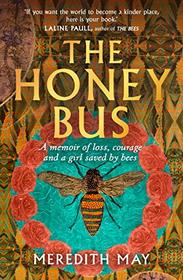Helpful Score: 2
Giving up, and vowing never, never, never to be conned into reading another "poor little me" memoir. Ever. Again.
Book club choice, and my immediate (cowardly) inclination was to discover that I had an previous engagement. In Azerbaijan. But no, I thought, that's the Coward's Way Out. And no, I thought, according to the blurb, this is a life-affirming story of how bee-keeping saves the neglected child of a dysfunctional family from her sad childhood. Bee-keeping is good, right?
And, if that's what May had done, it might have been bearable. In spite of my opening rant, I am aware that it's possible to write interesting and even moving memoirs, using some life-affirming activity as a way of gradually building up the author's story, intercutting it with an interesting activity and showing how that activity is a metaphor for the author's situation.
May doesn't do that. From the opening pages, it's me, me, me, bees, me. She has a photographic memory for her childhood experience, from the moment her mentally-ill mother left her husband, and dragged their two children across the country to California, back to her mother's ramshackle home, where her deep depression at The Unfairness of It All can be indulged, and the neglect of her children can outsourced to a grandmother who bitterly resents the imposition.
There's no denying that May's childhood was a nightmare, but that fact in itself doesn't make me want to read the resulting act of revenge on the adults who let her down, or feel that I have learned anything -- even about bees -- by reading it.
Azerbaijan, here I come.
Book club choice, and my immediate (cowardly) inclination was to discover that I had an previous engagement. In Azerbaijan. But no, I thought, that's the Coward's Way Out. And no, I thought, according to the blurb, this is a life-affirming story of how bee-keeping saves the neglected child of a dysfunctional family from her sad childhood. Bee-keeping is good, right?
And, if that's what May had done, it might have been bearable. In spite of my opening rant, I am aware that it's possible to write interesting and even moving memoirs, using some life-affirming activity as a way of gradually building up the author's story, intercutting it with an interesting activity and showing how that activity is a metaphor for the author's situation.
May doesn't do that. From the opening pages, it's me, me, me, bees, me. She has a photographic memory for her childhood experience, from the moment her mentally-ill mother left her husband, and dragged their two children across the country to California, back to her mother's ramshackle home, where her deep depression at The Unfairness of It All can be indulged, and the neglect of her children can outsourced to a grandmother who bitterly resents the imposition.
There's no denying that May's childhood was a nightmare, but that fact in itself doesn't make me want to read the resulting act of revenge on the adults who let her down, or feel that I have learned anything -- even about bees -- by reading it.
Azerbaijan, here I come.




